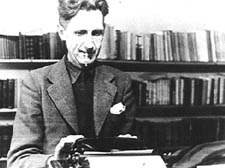|
|
 |
| |

George Orwell: fag in mouth at his typewriter |
Big and little lies in an absence of absolute truth
Orwell tried to change the world while serving busmen and baronets in a small bookshop, writes Gerald Isaaman
WHAT is fascinating is that, nearly 70 years after he wrote them, the subjects of George Orwell’s essays in Books v. Cigarettes are still open for debate and – in some cases – remain stubbornly unresolved.
The seven pieces here, which range from his early education and selling books in Hampstead to censorship and fighting for your country, come neatly wrapped up in a single title in Penguin’s Great Ideas series of “books that have changed the world”. The books were originally priced at 3s 6d (17½p) a copy.
Apart from provoking outrage and enlightenment, Orwell’s essays confront the dilemma of progress versus eternal issues of war and peace.
They remind us how far we have come when you read How the Poor Die, from 1946, when Orwell, sick as ever with TB, was admitted to Hôpital X in Paris, enduring a compulsory bath first, just as he would in prison or the workhouse.
“I myself, with an exceptionally fine specimen of a bronchial rattle, sometimes had as many as a dozen students queuing up to listen to my chest,” he writes. “It was a queer feeling – queer, I mean, because of their intense interest in learning their job, together with a seeming lack of any perception that the patients were human beings.”
But this is nothing compared to the horrors on the wards he records. “This business of people just dying like animals, for instance, with nobody standing by, nobody interested, the death not even noticed till the morning – this happened more than once.”
Of his days at St Cyprians, the prep school he detested, he says: “To the age of about 14 I believed in God, and believed that the accounts given of him were true.
“But I was well aware that I did not love him. On the contrary, I hated him, just as I hated Jesus and the Hebrew patriarchs…
“The Prayer Book told you, for example, to love God and fear him: but how could you love someone whom you feared?”
He tackles literary censorship, an issue most recently revived by the fire-bombing of Islington publishers Gibson Square over a contentious Muslim novel.
And he tells us, in 1946: “The friends of totalitarianism in this country tend to argue that since absolute truth is not attainable, a big lie is no worse than a little lie.
“In England the immediate enemies of truthfulness, and hence of freedom of thought, are the press lords, the film magnates and the bureaucrats, but that on a long view the weakening of the desire for liberty among the intellectuals themselves is the most serious symptom of all…
“Totalitarianism, however, does not so much promise an age of faith, as an age of schizophrenia. A society becomes totalitarian when its structure becomes flagrantly artificial; that is, when its ruling class has lost its function but succeeds in clinging to power by force or fraud,”
Orwell remains staunchly patriotic, pointing out how, from a lad, he was taught to carry a gun to protect the nation. Yet his eye is on the future, and massive change, as always.
“To be loyal both to Chamberlain’s England and to the England of tomorrow might seem an impossibility, if one did not know it to be an everyday phenomenon,” he contends, in 1940.
“Only revolution can save England, that has been obvious for years, but now the revolution has started, and it may proceed quite quickly if only we can keep Hitler out. Within two years, maybe a year, if only we can hang on, we shall see changes that will surprise the idiots who have no foresight.”
How far have we come then? Not a great distance when you read Orwell’s musing about life in Booklovers’ Corner, in Pond Street, Hampstead, a time when he lived in a nearby flat while writing Keep the Aspidistra Flying and paying the rent by working in the bookshop.
In his Bookshop Memories of 1936, he writes about being plagued by “the decayed person smelling of old breadcrusts” and “the person who orders large quantities of books for which he has not the smallest intention of paying” while worrying that the real customers read only rubbish.
“Our shop stood exactly on the frontier between Hampstead and Camden Town, and we were frequented by all types from baronets to bus conductors,” he says. “It is therefore worth noting that of all the authors in our library the one who ‘went out’ the best was – Priestley? Hemingway? Walpole? Wodehouse? No, Ethel M Dell, with Warwick Deeping a good second and Jeffrey Farnol, I should say, third.”
Remember that when you amble past the spot and see the commemorative plaque on the wall with Orwell’s face modelled on it and staring out towards 2084.
•
 |
| |
|
 |
 |
|
 |
|



